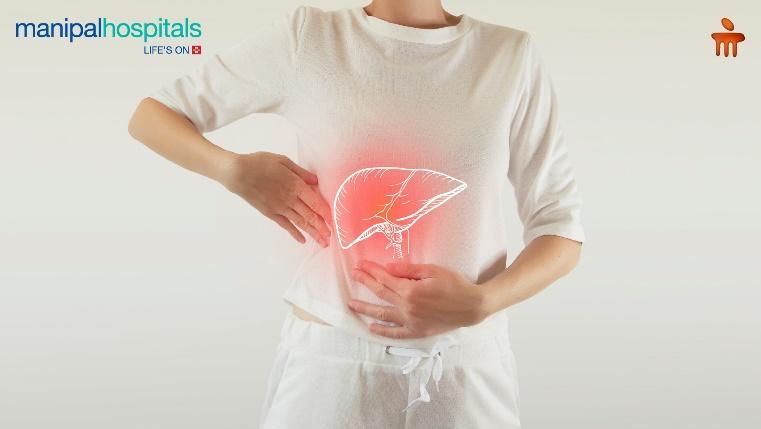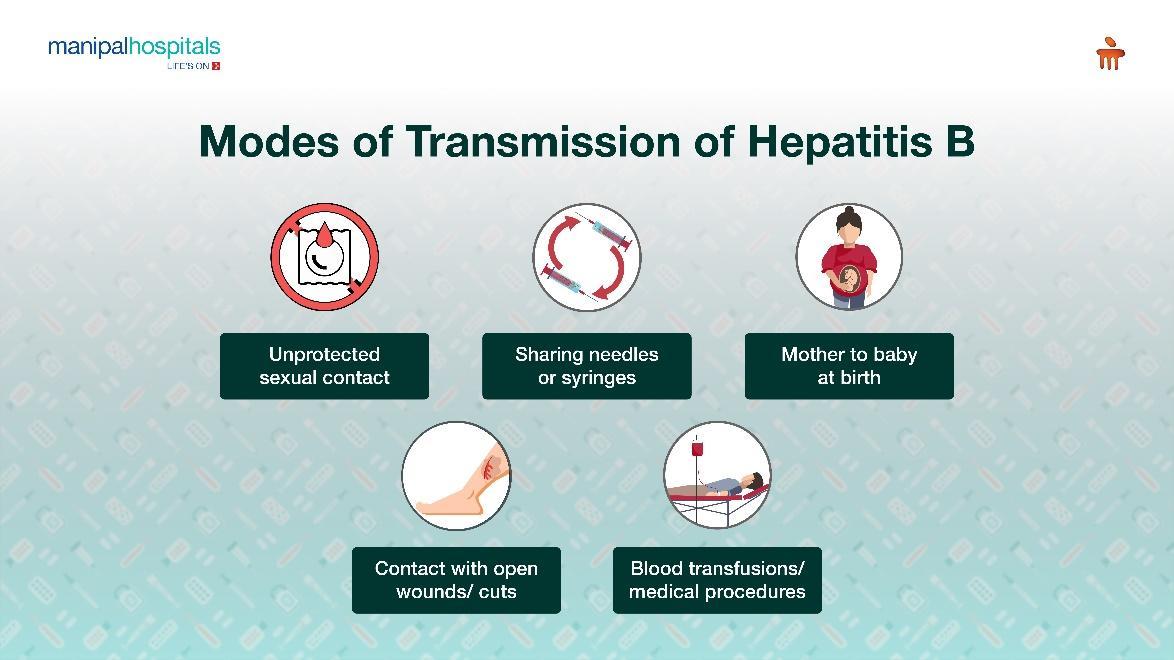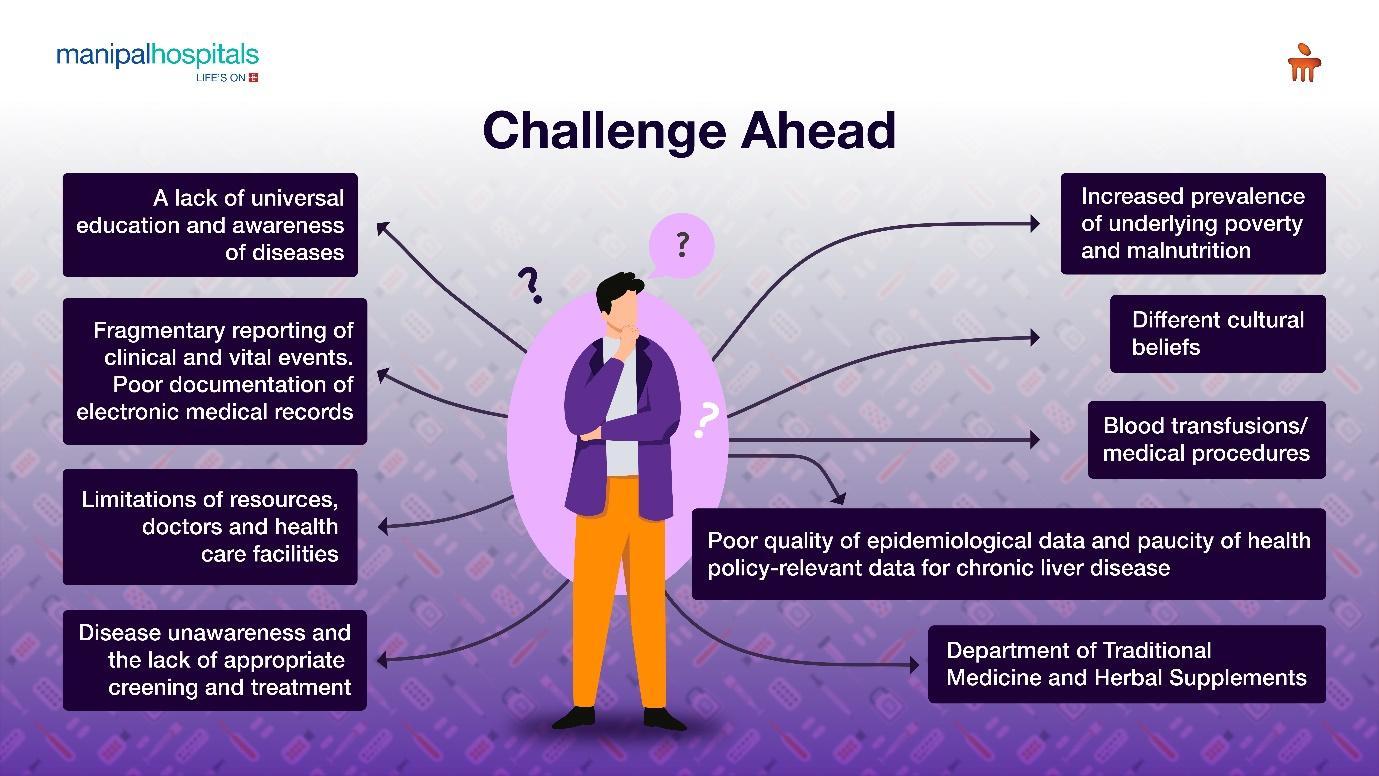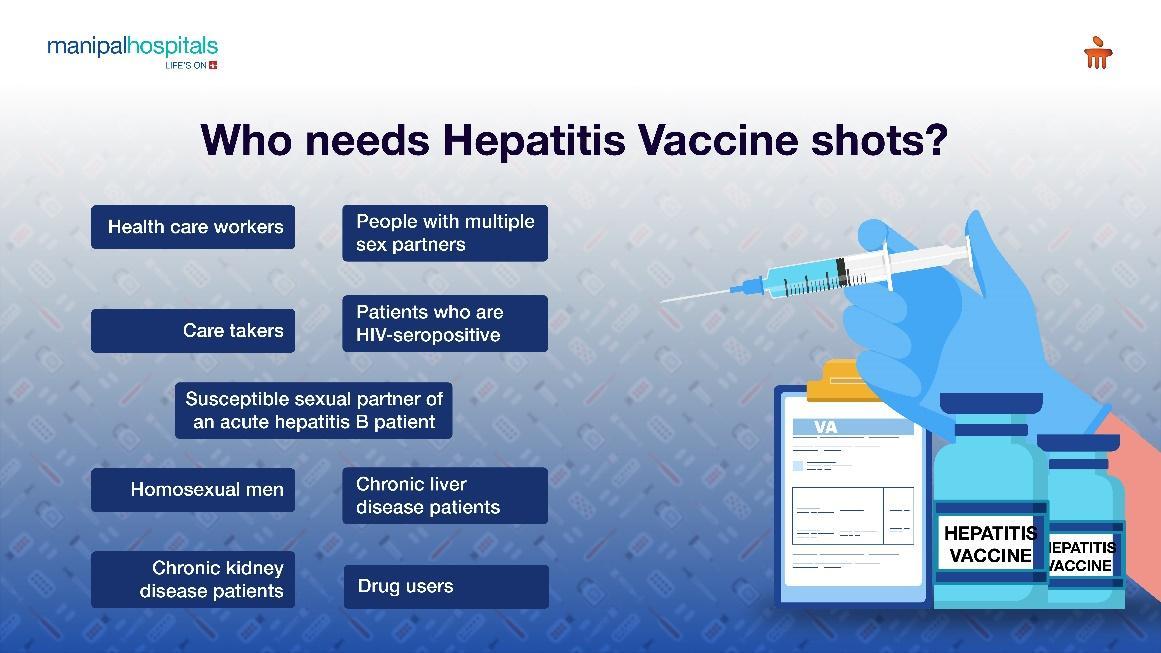
Hearing the word "Hepatitis" can be alarming, especially if it affects someone close to you. It’s important to understand the condition to manage it successfully. Among the different types of hepatitis, Hepatitis B is one of the most common and also one of the most preventable.
In this blog, we will explain what Hepatitis B is, the different Hepatitis types, and the modes of transmission. Recognising symptoms and signs of viral hepatitis is important as it will help to seek treatment early and avoid the development of dreaded complications like acute liver failure and cirrhosis. From a health professional’s point of view, a thorough knowledge of post-exposure prophylaxis is likely helpful. A vaccine is also available, so preventing transmission to newborns in pregnant females affected by Hepatitis B is crucial.
Synopsis
- What Is Hepatitis?
- What Is Hepatitis B?
- What are the different types of viral hepatitis?
- How Is Hepatitis B Transmitted?
- Mode of transmission of Hepatitis B
- How is Hepatitis A Transmission Different?
- Symptoms of Hepatitis B
- Who Is at Risk for Hepatitis B?
- How to Protect Yourself from Hepatitis B?
- When to Get Tested
- Conclusion
What Is Hepatitis?
Hepatitis means inflammation of the liver. The liver is a vital organ that helps filter toxins, store energy, and fight infections. When it gets inflamed, its functions can slow down or stop, affecting your overall health.
There are many causes of hepatitis, such as viruses, alcohol, certain medicines, and autoimmune diseases. But the most common types are caused by viruses: Hepatitis A, B, C, D, and E. Each type differs in how it spreads, how long it lasts, and how it affects the liver.

-
In India, liver disease contributed to 18.3% of the two million global liver disease-related deaths in 2015.
-
Different CLDs and cirrhosis accounted for 2.1% of all deaths in India in the year 2016.
-
HBV is the most common overall cause of CLD, including cirrhosis and HCC.
-
The Asia-pacific region accounted for 62.6% of global deaths due to liver diseases in 2015, 54.3% of global deaths due to HCC, and more than two-thirds of the global burden of acute viral hepatitis occurred in this region in 2015.
-
Hepatitis E is still the most common cause of acute hepatitis and acute liver failure in India.
What Is Hepatitis B?
Hepatitis B is a liver infection caused by a virus known as the hepatitis B virus, or HBV. This virus can cause both acute (short-term) and chronic (long-term) illness. Some people recover completely, while others live with the virus for years. Hepatitis B is a global health concern.
According to the World Health Organisation (WHO), over 250 million people are living with chronic Hepatitis B around the world. Approximately 60 % of the world’s population resides where HBV is highly endemic. Broader coverage of vaccination and use of antiviral therapy has helped to reduce HBV-related deaths due to cirrhosis and liver cancer, but immigration from high-endemic regions continues to dilate the outcomes.
What are the different types of viral hepatitis?
As you can see, Hepatitis B is unique because it can become chronic and lead to serious liver problems like cirrhosis or liver cancer if untreated.
|
Hepatitis Type |
Cause |
Mode of Transmission |
Chronic Infection? |
Vaccine Available? |
|
A |
Hepatitis A virus |
Contaminated food or water |
No |
Yes |
|
B |
Hepatitis B virus |
Blood, sexual contact, mother to baby |
Yes |
Yes |
|
C |
Hepatitis C virus |
Blood-to-blood contact |
Yes |
No |
|
D |
Hepatitis D virus (only with B) |
Blood-to-blood contact |
Yes |
No (but prevented via Hep B vaccine) |
|
E |
Hepatitis E virus |
Contaminated water |
No (usually) |
In some countries |
How Is Hepatitis B Transmitted?
Understanding the mode of Hepatitis B transmission is key to staying safe. Unlike hepatitis A, which is usually spread through contaminated food or water, hepatitis B is passed through infected blood or bodily fluids.

Mode of transmission of Hepatitis B
- Unprotected sexual contact: HBV can be transmitted through vaginal, anal, or oral sex, especially if one partner is infected and not using protection.
- Sharing needles or syringes: People who use injectable drugs face a higher risk of contracting hepatitis B due to shared needles. Even a small amount of infected blood can carry the virus.
- From mother to baby at birth: If a pregnant woman has Hepatitis B, her baby can get infected during delivery.
- Contact with open wounds or cuts: Sharing razors, toothbrushes, or even minor cuts can be a risk if blood is exchanged.
- Blood transfusions or medical procedures (in rare cases): Today, most blood is screened before use. But in some areas with limited healthcare access, this may still be a concern.
Important Note:
Hepatitis B is not spread by casual contact, so you can’t get it from hugging, shaking hands, sharing food, or coughing and sneezing.

How is Hepatitis A Transmission Different?
Unlike Hepatitis B, Hepatitis A transmission usually happens through the faecal-oral route. That means the virus spreads when a person ingests food or water contaminated with the stool of someone infected. The infection often spreads in places where hygiene or sanitation practices are poor. Unlike Hepatitis B, Hepatitis A doesn’t become chronic, and most people recover fully with rest.
Symptoms of Hepatitis B
Many people with Hepatitis B do not feel sick right away. Many people don’t realise they have hepatitis B until a blood test reveals it.
When symptoms do appear, they may include:
-
Fatigue
-
Loss of appetite
-
Skin and the white area of the eyes may turn yellow (Jaundice).
-
Abdominal pain, especially on the right side
These symptoms can last a few weeks to several months. If the infection becomes chronic, symptoms may come and go or remain mild for years before causing serious liver damage.
Who Is at Risk for Hepatitis B?
Anyone can get Hepatitis B, but the risk is higher if you:
-
Have unprotected sex with multiple partners
-
Inject drugs or share needles
-
Live with someone who has chronic Hepatitis B
-
Work in healthcare or with human blood
-
Were born in a region with high Hepatitis B rates
-
Were not vaccinated as a child
Newborns of infected mothers are especially vulnerable without proper preventive steps.
How to Protect Yourself from Hepatitis B?
The best protection is the Hepatitis B vaccine, which is safe and effective. It’s given in 3 doses and offers long-term immunity.
Other prevention tips:
-
Use condoms during sex
-
Avoid sharing needles, razors, or toothbrushes
-
Make sure medical or dental equipment is properly sterilised
-
Get tested if you’re at risk
-
If pregnant, get screened during your first antenatal visit

When to Get Tested
You should consider getting a Hepatitis B test if:
-
You belong to a high-risk group
-
You’ve been exposed to infected blood or body fluids
-
You’re planning to start a family
-
You were born in or travelled to high-risk areas
Early testing helps prevent the spread and protects your liver health.
Conclusion
Hepatitis B is a serious but preventable disease. Understanding the types of hepatitis, especially the mode of Hepatitis b transmission, helps protect not just yourself but those around you. With the right information, regular testing, and a simple vaccine, we can prevent this virus from spreading further. If you think you might be at risk or haven’t been vaccinated yet, speak to your doctor today. You can also contact our doctors at Manipal Hospitals, Saltlake for any assistance. A small step now can save you from big health problems later.
FAQ's
Hepatitis B cannot always be cured completely, especially if it becomes chronic. However, treatment can manage the virus and prevent serious liver damage. Some people with acute Hepatitis B recover fully without needing long-term treatment.
Yes, in most cases, Hepatitis B is considered more serious than Hepatitis A. This is because it can become chronic and lead to liver complications such as cirrhosis or liver cancer, while Hepatitis A usually resolves on its own without lasting damage.
No, Hepatitis B is not spread through casual contact like kissing, hugging, or sharing food. It spreads only through infected blood, semen, or other bodily fluids.
In acute cases, the virus may clear from the body within six months. In chronic cases, it can stay for life unless effectively managed with treatment.
If you recover from Hepatitis B or are vaccinated, your body usually develops immunity. However, those with a weak immune system may be at risk for reinfection or reactivation of the virus.





















 7 Min Read
7 Min Read



















